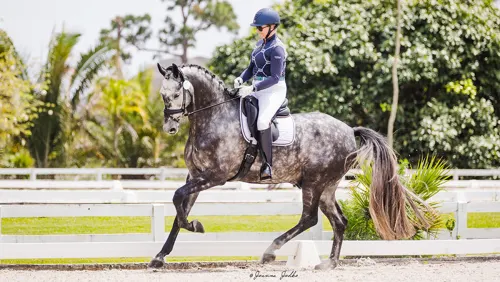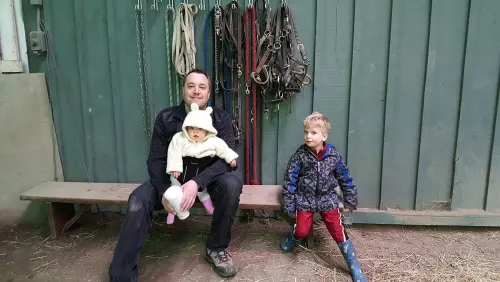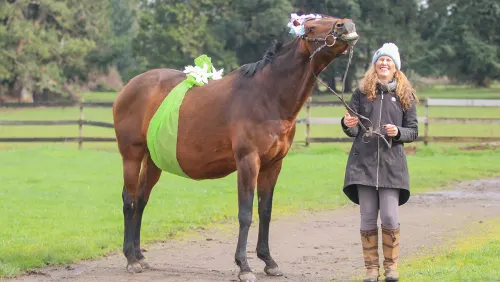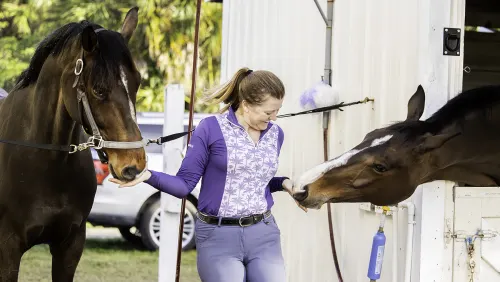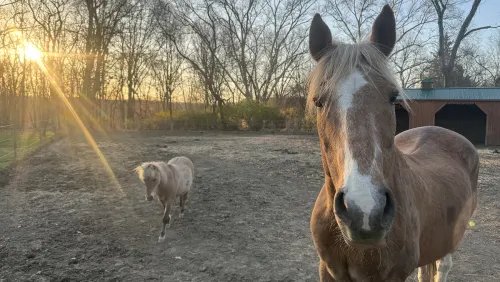With the birth of my second daughter Madison and the spring competition season in full swing, I’ve been thinking of the importance of strong relationships. Not only in my family life, but with my equine partners.
One of the most important relationships a rider can have is with their horse. For better or worse a rider and their horse are a mirror image of each other. It is a rare sight to see a horse completely coming through it’s topline in a relaxed, engaged, harmonious way with a rider who’s locked in their hips and arms. In order for a horse to realize it’s full physical potential, their rider must mirror those actions being asked for with their own body.
In a three-day event partnership, the rider’s lower leg is the horse’s hind end locomotion. A long, relaxed thigh with a swinging hip and seat is an engaged, swinging back in the horse. A consistent upper body posture is a consistent balance through the withers and shoulders of the horse. And lastly, the shoulders, elbows and hands of the rider is the neck, poll and jaw of the horse. The rider’s balance is the horse’s balance. The rider’s rhythm is the horse’s rhythm. The rider’s engaged core is the horse’s engaged core.
To me, what’s as important, if not more so, then the physical correlation is the mental and emotional connection. Again, it is a rare sight to see a horse performing in a confident, relaxed way with a nervous, agitated rider. Horses are not predominantly verbal communicators. They are extremely empathetic animals that are keenly aware of the body language and the mental state of those around them, especially their rider.
The more a rider is aware of the fact that their emotional state and mental focus has a profound effect on their horse, the more successful a partnership they’ll form.
While every person is their own unique individual, so too are horses. While I firmly believe the “mirror” concept is relevant to every horse, some are more susceptible to their rider’s mental state. Just as there are naturally confident horses, there are also those who suffer from low self-esteem just as some people struggle with low self-esteem. For these horses to succeed in this sport, their relationship with their rider is vital.
ADVERTISEMENT
I’ve ridden quite a few of these “partnership” horses in my career but one really stands out. Kilfinnan, or “Felix,” was a horse I competed through advanced in the early 2000s. I bought him off the track as a 3-year-old and his early career went incredibly smoothly. That all changed in 1999 when I had a bad fall on another horse and shattered my femur and elbow. Because I thought so highly of Felix and didn’t want his career to stall while I recovered, I sent him to a top rider to compete. It turned out to be the worst thing I could have done for him.
My confident young horse became so unbelievably behavioral to ride and on the ground, I just hoped he didn’t hurt anyone while I sat and healed. Even when I was healthy again and we were reunited, he was a shell of his previous self. It got to the point where I literally couldn’t give him away, and believe me I tried!
The turning point actually came from a terrible event. One week before he was to leave for a new home he colicked and needed surgery. Looking back on it now, I’m sure he suffered from terrible ulcers having to move to all these different barns and riders, which led to his behavior changes and colic. We just didn’t know as much about ulcers in horses then as we do now.
I really believe the major factor in his issues was how important his relationship with me was to his competitive career. I wasn’t nearly as skilled as the riders I sent him to but I was his friend and security blanket and that was taken from him. His tendency toward insecurity and the loss of his emotional anchor led him to act out. That in turn led to negative feelings toward him which perpetuated the vicious cycle.
The recovery from colic surgery led to a new beginning of sorts for the two of us. That time allowed us to reconnect in our relationship again. I learned to appreciate him again and he had his anchor back. And wouldn’t you know it, those positive mental views I had of him again really helped him turn the corner.

Sean on Kilfinnan.
ADVERTISEMENT
One year after the colic surgery he and I finished fourth in the Radnor CCI** (Pa.) and he went on to have a successful advanced career. I’m convinced this success was in large part due to the psychological bond Felix and I had. My confidence in him became his own.
Felix was not the most successful horse I’ve competed nor the most talented, but he had the most profound impact on my career. I now seek out to learn who my competition horses are as individuals and where they are coming from in our relationship. It’s helped me discover that one of my current horses Casalino, while supremely talented, is shy by nature and needs me to help stabilize his insecurities. That Flambeau B will give 110 percent in everything she does even if it’s a quiet hack day. We joke that her motto is, “I’m trying really damn hard to RELAX!” While this makes her an amazing competitor, I get the best work out of her if most of our rides are geared toward relaxation.
I’m learning that my new upper-level ride, Bastiaan, is hyper aware of where the rider’s body position is at all times. This is an asset to our careers together, especially on cross-country, but it’s something that could affect our consistency if I don’t work on his sense of relaxed focus. Like I said before, all horses are their own unique individual selves so it’s up to us rider’s to recognize our horse’s personal qualities.
There are not too many greater feelings then the physical and psychological connection a rider can have with their horse. It will not only provide a considerable competitive advantage but it’s just good for the soul. These amazing animals are full of empathy toward us, we just have to be willing to listen and reciprocate.
Eventer Sean McQuillan started riding in Maryland at age 12 and by the time he was 20 he was eventing at the advanced level. He worked as an assistant trainer for the O’Connor Eventing Team (Va.), but also has a wide breadth of experience. He has hunted professionally with the Orange County Hounds (Va.), trained steeplechase horses and competed in the jumpers. His wife, Kendra, is an experience eventer, groom, barn manager and saddle fitter. Together, they run McQuillan Equestrian & Kilfinnan Stables.
You can read his first blog, “Taking The Sport By Storm Will Take Some Time,” here.







